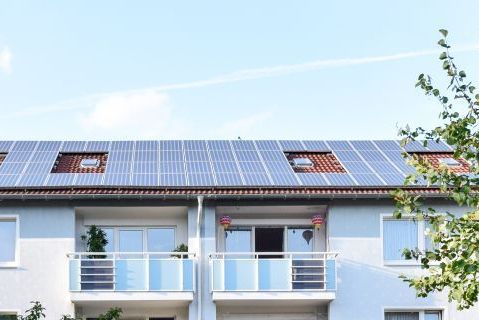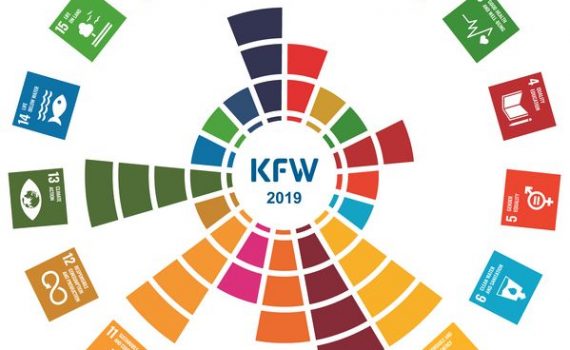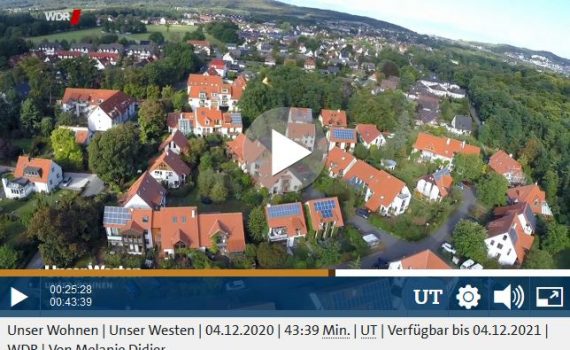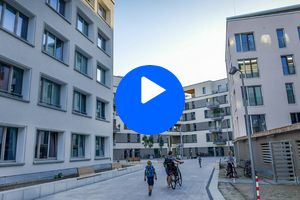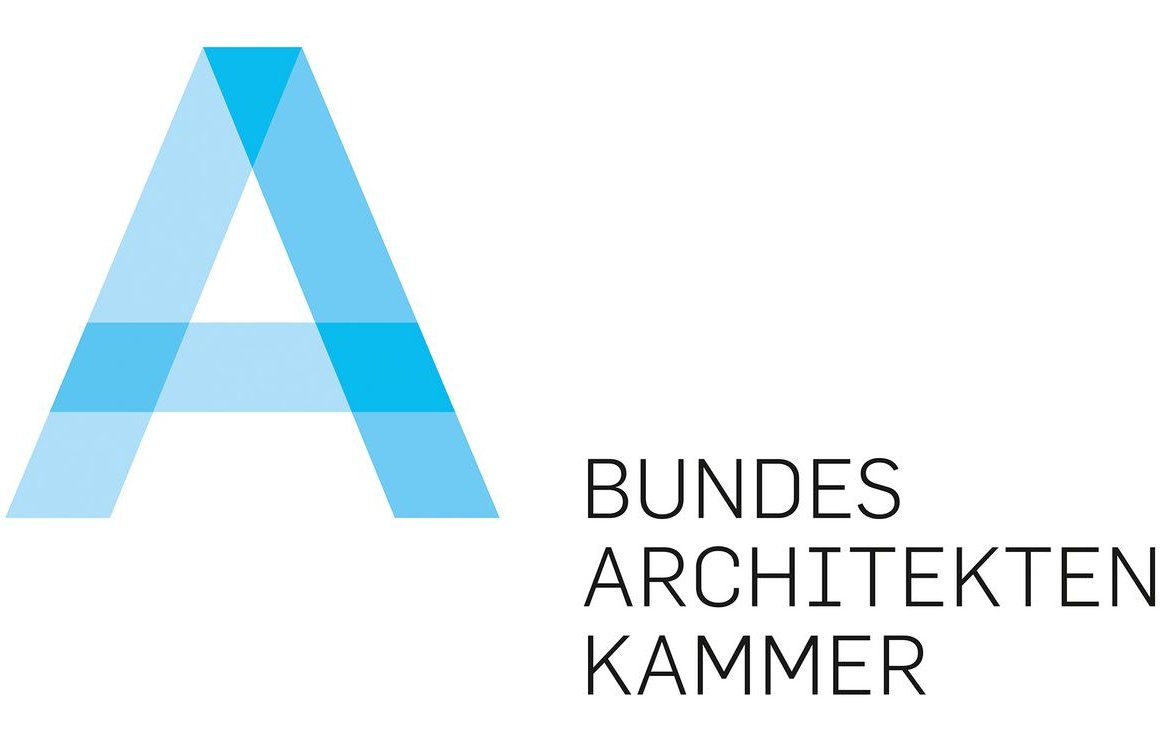 The Federal Chamber of Architects (BAK) and the Federal Foundation of Baukultur presented their proposal for a "Baukultur Innovation Programme" to politicians in Berlin today on behalf of the planning and construction industry.
Anne Katrin Bohle, State Secretary at the Federal Ministry of the Interior, Building and Community, accepted the four-point plan. In it, the authors suggest measures to overcome the coronavirus crisis that will have a lasting economic and social impact.
The Federal Chamber of Architects (BAK) and the Federal Foundation of Baukultur presented their proposal for a "Baukultur Innovation Programme" to politicians in Berlin today on behalf of the planning and construction industry.
Anne Katrin Bohle, State Secretary at the Federal Ministry of the Interior, Building and Community, accepted the four-point plan. In it, the authors suggest measures to overcome the coronavirus crisis that will have a lasting economic and social impact.
Kategorie für Blog: Typology
 Berlin/Cologne. Climate protection and adaptation to the consequences of climate change will become increasingly important for cities. This is one of the findings of the survey of (Lord) Mayors of large German cities* conducted by the German Institute of Urban Affairs in January and February 2020. Almost two-thirds of the respondents named climate protection as an important municipal issue for the future. This means that the number of mayors who attribute an increase in importance to this field of municipal policy action has more than tripled compared to the previous year. Future surveys will show how strongly this result was influenced by the protests of the 'Fridays for Future' movement.
Berlin/Cologne. Climate protection and adaptation to the consequences of climate change will become increasingly important for cities. This is one of the findings of the survey of (Lord) Mayors of large German cities* conducted by the German Institute of Urban Affairs in January and February 2020. Almost two-thirds of the respondents named climate protection as an important municipal issue for the future. This means that the number of mayors who attribute an increase in importance to this field of municipal policy action has more than tripled compared to the previous year. Future surveys will show how strongly this result was influenced by the protests of the 'Fridays for Future' movement.
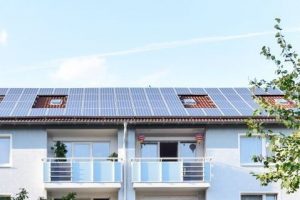 In Vienna, as a rule, no residential building may be erected without a solar system in the future. This is stipulated in an amendment to the building code, which is currently being evaluated, the red-green city government informed on Monday. Currently, such a photovoltaic obligation applies only to industrial buildings.
In Vienna, as a rule, no residential building may be erected without a solar system in the future. This is stipulated in an amendment to the building code, which is currently being evaluated, the red-green city government informed on Monday. Currently, such a photovoltaic obligation applies only to industrial buildings.
 In research, neighbourhoods have been recognised as an important level of action for climate protection. For this reason, the BMBF, BMU and the Federal Ministry of Building and Transport have funded several research projects on sustainable neighbourhoods, which are now being worked on. The consensus of the research projects presented and the funding bodies is that it is important to research neighbourhood concepts for a climate-friendly heat and electricity supply as well as an environmentally friendly mobility offer in an economical way" and "to link the individual elements in the sense of a functioning sector coupling in a meaningful way."
The focus articles in the "Ecological Economy 3/2019" issue highlight the potential of the neighbourhood approach for the implementation of climate protection measures, but also present best practice examples and discuss feasibility in practice.
In research, neighbourhoods have been recognised as an important level of action for climate protection. For this reason, the BMBF, BMU and the Federal Ministry of Building and Transport have funded several research projects on sustainable neighbourhoods, which are now being worked on. The consensus of the research projects presented and the funding bodies is that it is important to research neighbourhood concepts for a climate-friendly heat and electricity supply as well as an environmentally friendly mobility offer in an economical way" and "to link the individual elements in the sense of a functioning sector coupling in a meaningful way."
The focus articles in the "Ecological Economy 3/2019" issue highlight the potential of the neighbourhood approach for the implementation of climate protection measures, but also present best practice examples and discuss feasibility in practice.
 Konturen einer solidarischen Stadtpolitik
Anton Brokow-Loga (Hrsg.),
Frank Eckardt (Hrsg.)
Städte ohne Wachstum – eine bislang kaum vorstellbare Vision. Doch Klimawandel,
Ressourcenverschwendung, wachsende soziale Ungleichheiten und viele andere
Zukunftsgefahren stellen das bisherige Allheilmittel Wachstum grundsätzlich infrage. Wie wollen
wir heute und morgen zusammenleben? Wie gestalten wir ein gutes Leben für alle in der Stadt?
Konturen einer solidarischen Stadtpolitik
Anton Brokow-Loga (Hrsg.),
Frank Eckardt (Hrsg.)
Städte ohne Wachstum – eine bislang kaum vorstellbare Vision. Doch Klimawandel,
Ressourcenverschwendung, wachsende soziale Ungleichheiten und viele andere
Zukunftsgefahren stellen das bisherige Allheilmittel Wachstum grundsätzlich infrage. Wie wollen
wir heute und morgen zusammenleben? Wie gestalten wir ein gutes Leben für alle in der Stadt?
- Over EUR 28 billion for "climate protection measures": KfW is one of the most important supporters of the Paris climate goals
- Promotional bank is a global pioneer with its standardised SDG mapping
- Strong international interest in KfW SDG mapping
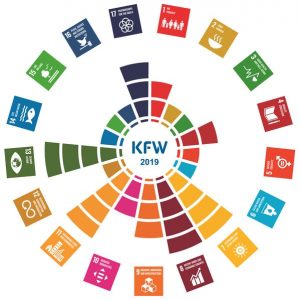 KfW is today publishing the results of the SDG mapping of new commitments throughout the Group in 2019. In order to clarify the individual contribution made by KfW's new commitments to achieving the UN Sustainable Development Goals, KfW has developed a standardised procedure: 1,500 indicators are used each year to determine to which SDGs KfW's new commitments can be assigned. This makes the contribution transparent at both group and business sector level.
KfW is today publishing the results of the SDG mapping of new commitments throughout the Group in 2019. In order to clarify the individual contribution made by KfW's new commitments to achieving the UN Sustainable Development Goals, KfW has developed a standardised procedure: 1,500 indicators are used each year to determine to which SDGs KfW's new commitments can be assigned. This makes the contribution transparent at both group and business sector level.
Min. 4:36; Video from 18.02.2020; Ed.: MWSP Mannheim
Mannheim's conversion is green - this is demonstrated by the work of the municipal development company MWSP on the TURLEY, TAYLOR, FRANKLIN and SPINELLI sites.
The federal government can give a short-term boost to public housing construction in Germany and thus help to ease the acute housing shortage in many large cities. The key to this is three federally owned companies that provide flexible support to the federal states and local authorities in the development of construction projects and the construction of new housing: Firstly, a consultancy company that provides planning capacities to cities and municipalities. Secondly, a land fund that provides financial and conceptual support to local authorities nationwide in acquiring building land and financing infrastructure. Thirdly, an investment company that strengthens the equity of municipal housing construction companies through financial participation. Prof Dr Sebastian Dullien, Scientific Director of the Institute for Macroeconomics and Economic Research (IMK) at the Hans Böckler Foundation, and Prof Dr Tom Krebs from the University of Mannheim show this in a new concept for a federal "Future Housing" initiative.
Funding is available for greening facades and roofs as well as for unsealing on private, public and commercial properties in the Hannover city area.
From 2022, all new public buildings must be made of at least 50 per cent wood or other sustainable building materials. For buildings with more than eight storeys, the supporting structure must even be made entirely of wood. It was also decided that 90 ecological neighbourhoods and 100 urban farms will be built in Paris.
With retroactive effect from 1 January 2020, the timber construction subsidy in Hamburg has now officially been increased to EUR 0.80 per kilogramme of timber product as part of the various subsidised housing construction programmes. As a prerequisite for the subsidy,...
 [su_spacer]
The documentary features a 5-minute sequence about the Waldquelle ecological housing estate in Bielefeld. Ute Möller, one of the founders, gives a tour of the eco-settlement and talks about the experiences and developments in the now almost 25-year-old settlement with lots of wood, greenery and solar cells on the roof.
[su_spacer]
The documentary features a 5-minute sequence about the Waldquelle ecological housing estate in Bielefeld. Ute Möller, one of the founders, gives a tour of the eco-settlement and talks about the experiences and developments in the now almost 25-year-old settlement with lots of wood, greenery and solar cells on the roof.
Newly built districts with space-efficient mobility offers
A new sustainable urban district is being built on the west side of the Merwedekanal in a central location not far from Utrecht Central Station. The plan is to create a mixed-use district with 6,000 to 9,000 homes for approximately 12,000 residents. The area will become a showcase for healthy and sustainable living with innovative concepts for recycling, energy production, climate adaptation and mobility solutions. Planned completion: by 2024
Since 1 January 2020, all new buildings and general renovations of the BIG Group have been subject to the Group-wide mandatory minimum sustainable standard. The BIG minimum standard goes beyond the legal requirements and ensures that all projects of BIG and its subsidiary ARE achieve the klimaaktiv SILVER standard in any case. The sustainable minimum standard of the Bundesimmobiliengesellschaft (BIG) is a catalogue of criteria that must already be taken into account in the planning process for buildings. This makes the implementation of 43 measures of the BIG Holistic Building Programme (HBP)* and the achievement of at least 750 klimaaktiv points mandatory for all new construction and general refurbishment projects for which a planning invention procedure will be carried out from 2020. By implementing the minimum standard, CO2 emission values are significantly reduced, climate-damaging building materials are avoided and the phase-out of fossil fuels is accelerated.
7-storey timber (hybrid) building. 66 bathroom modules were designed as a complete technical core for the student apartments.
Climate protection has long been one of the most urgent topics for the housing industry. In order to achieve a climate-neutral building stock by 2050, the 24 founding companies of the Wohnen.2050 initiative met in Berlin on 28 January 2020 to found the association. The nationwide association was initiated by the Nassauische Heimstätte | Wohnstadt group of companies.
 "Don't just talk about climate change, act" - under this motto, the Nassauische Heimstätte | Wohnstadt Group invited founding partners from all over Germany to found the Initiative Wohnen.2050 (IW2050) association. The overarching objective is a climate policy alliance, which, in addition to strategic cooperation and a technical and content-related comparison, primarily focuses on economic and financial concerns to achieve the targets.
"Don't just talk about climate change, act" - under this motto, the Nassauische Heimstätte | Wohnstadt Group invited founding partners from all over Germany to found the Initiative Wohnen.2050 (IW2050) association. The overarching objective is a climate policy alliance, which, in addition to strategic cooperation and a technical and content-related comparison, primarily focuses on economic and financial concerns to achieve the targets.
 21.01.2020 Everyone is talking about sustainability - including the construction industry. A prize that the Federal Ministry for the Environment, Nature Conservation and Nuclear Safety (BMU) and the Federal Environment Agency (UBA) have been offering since today provides the appropriate topic for discussion: With the new "Federal Award for Environment and Building", which will be awarded for the first time in 2020, the initiators want to distinguish projects with exemplary character in terms of sustainability - not only in the classic areas of existing buildings and new buildings, but also in five other categories. All players in the building sector can apply. The deadline for entries is 15 April 2020.
21.01.2020 Everyone is talking about sustainability - including the construction industry. A prize that the Federal Ministry for the Environment, Nature Conservation and Nuclear Safety (BMU) and the Federal Environment Agency (UBA) have been offering since today provides the appropriate topic for discussion: With the new "Federal Award for Environment and Building", which will be awarded for the first time in 2020, the initiators want to distinguish projects with exemplary character in terms of sustainability - not only in the classic areas of existing buildings and new buildings, but also in five other categories. All players in the building sector can apply. The deadline for entries is 15 April 2020.
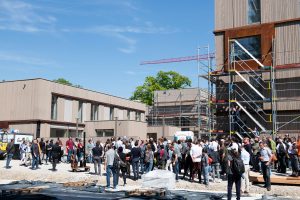 The Munich City Council's Committee for Urban Planning and Building Regulations has decided to promote the construction of new, contemporary timber construction projects. This year, the city council will develop a further subsidy programme for construction using wood and other renewable raw materials.
The grant programme is suitable for individual projects as well as larger housing estates and neighbourhoods. The aim of the city council is to ensure that around 50 per cent of the buildings on municipal land are constructed using timber.
The Munich City Council's Committee for Urban Planning and Building Regulations has decided to promote the construction of new, contemporary timber construction projects. This year, the city council will develop a further subsidy programme for construction using wood and other renewable raw materials.
The grant programme is suitable for individual projects as well as larger housing estates and neighbourhoods. The aim of the city council is to ensure that around 50 per cent of the buildings on municipal land are constructed using timber.
 Climate protection and socially just construction and housing must be considered together - Legal regulations in the rental housing sector and state subsidy practice undermine climate goals in the building sector - Deutsche Umwelthilfe and Deutscher Mieterbund present 10-point immediate programme for socially acceptable design of energy modernisation in existing and new buildings - KfW subsidy practice must be subjected to a reality check - Social provisions must be supplemented by climate policy requirements
Climate protection and socially just construction and housing must be considered together - Legal regulations in the rental housing sector and state subsidy practice undermine climate goals in the building sector - Deutsche Umwelthilfe and Deutscher Mieterbund present 10-point immediate programme for socially acceptable design of energy modernisation in existing and new buildings - KfW subsidy practice must be subjected to a reality check - Social provisions must be supplemented by climate policy requirements
 One of the Herculean tasks to achieve the climate targets is to radically reduce CO2 emissions from the heat supply. A group of researchers led by the Institute for Ecological Economy Research (IÖW) shows how cities can turn away from coal, oil and gas in a socially acceptable way. The project "Urban Heat Turnaround" investigated possible contributions from renewable energies and local heat sources in Berlin's urban neighbourhoods. "Waste heat from businesses, heat from waste water or geothermal energy have hardly been used so far.
One of the Herculean tasks to achieve the climate targets is to radically reduce CO2 emissions from the heat supply. A group of researchers led by the Institute for Ecological Economy Research (IÖW) shows how cities can turn away from coal, oil and gas in a socially acceptable way. The project "Urban Heat Turnaround" investigated possible contributions from renewable energies and local heat sources in Berlin's urban neighbourhoods. "Waste heat from businesses, heat from waste water or geothermal energy have hardly been used so far.
Almost €1 billion in federal funding for urban development and social integration in neighbourhoods in 2020 The federal and state governments have jointly developed a new structure for urban development funding from 2020: A total of €790 million will be available in three (instead of the previous six) concentrated urban development funding programmes. In addition to the funding requirement of climate change/climate adaptation, new [...]
 The aim of the handbook is to provide municipal actors with concrete tools that can be used to keep and locate production in urban areas. In the joint project UrbaneProduktion.Ruhr, funded by the Federal Ministry of Education and Research, research was carried out from October 2016 to December 2019 into whether and how it is possible to bring production back to the city.
The aim of the handbook is to provide municipal actors with concrete tools that can be used to keep and locate production in urban areas. In the joint project UrbaneProduktion.Ruhr, funded by the Federal Ministry of Education and Research, research was carried out from October 2016 to December 2019 into whether and how it is possible to bring production back to the city.
Germany's largest cooperative housing project in Berlin 28:58 min Video available until: 12/02/2020 First broadcast on: 2.12.2019 Living in the metropolis, in a large community, according to its own rules. Central, energy-saving, ecological, cosmopolitan, inclusive. The residents of Möckernkiez in Berlin-Kreuzberg have fulfilled this dream.
For almost fifteen years, Rob Hopkins has been developing a method for preparing our societies for the coming upheavals. Video: 5 min, available from 6.12.2019 to 8.12.2021
Dynamic master plan for the Patrick Henry Village presented / Citizen participation from 9 December A central park with a lake in the centre, diversity in architecture and in the use of buildings, energy production directly in the neighbourhood, a ring road, large neighbourhood garages, the public space for it free of parking spaces - these are just a few aspects from [...]
Senate adopts concrete measures for the next ten years and sets new CO2-targets for 2030 and 2050
![]() bring-together is a digital matching platform for collaborative housing projects and people looking for a community. The platform allows you a dynamic matching instead of a classic advertisement. In this way, needs are brought together. This makes it easier for you to find like-minded people and your own individual family of choice for communal living. The platform is for people who want to revolutionize community living and housing. "We believe that communities are the only sustainable way of living because sustainable, connected and responsible living is only possible in community."
bring-together is a digital matching platform for collaborative housing projects and people looking for a community. The platform allows you a dynamic matching instead of a classic advertisement. In this way, needs are brought together. This makes it easier for you to find like-minded people and your own individual family of choice for communal living. The platform is for people who want to revolutionize community living and housing. "We believe that communities are the only sustainable way of living because sustainable, connected and responsible living is only possible in community."
The ecovillage Sieben Linden has existed near Berlin for 30 years. The documentary gives a detailed insight into life there and what the villagers have experienced so far. Available until 28.10.2024
The programme series plan b uses the example of Seestadt Aspern in Vienna to explain what a "circular economy" can look like in concrete terms. Seestadt is one of the largest urban development areas in Europe. By 2028, high-quality living space for more than 20,000 people and almost as many jobs will be created in several stages in the north-east of Vienna's 22nd district. The aim is to create a sustainable neighbourhood.
(6:25 min.) published on 5.11.2019 The city of Eschweiler (North Rhine-Westphalia) has been awarded the "Climate Active Municipality 2019" climate protection prize by the Federal Ministry for the Environment in Category 1: "Resource and energy efficiency in the municipality". The city of Eschweiler is committed to more resource and climate protection with its Factor X construction areas. The prize is awarded by the Federal Ministry for the Environment (BMU) as part of the National Climate Initiative (NKI), which is implemented by the German Institute of Urban Affairs gGmbh (Difu).
The call for proposals "City of the Future - Towards Plus-Energy Neighbourhoods" builds on previous experience from the research programme specific focus areas and R&D services. All stakeholders who are involved in research and development issues relating to buildings, neighbourhoods and cities and who want to tackle the new challenges of digitalisation in the construction industry, the realisation of plus-energy neighbourhoods and the development of innovative urban greening technologies can submit proposals. Around €8.3 million is available for the 7th call for proposals as part of the "City of the Future" programme. The call runs until 30 January 2020.
24 October 2019 Strengthen energy refurbishment of buildings and demand responsibility from landlords. Housing policy must create supportive framework conditions and thus contribute to the reduction of living space. "For a necessary energy turnaround in the housing industry, conditions must be created that demonstrate tangible incentives for owners and users to consume less energy in the future," [...]
With the timber construction funding program, the city wants to promote concrete timber buildings, especially in residential construction Timber Construction Guide presents 29 realized and forward-looking timber construction projects in Freiburg More climate protection with the renewable raw material wood. Timber construction in Freiburg is an important instrument for climate protection and indispensable for achieving the city's ambitious climate protection goals. […]
Cooperation between Stadtwerke and berlinovo for largest German tenant power project Mietersonne Kaulsdorf, the largest German tenant power project with a capacity of almost 3.4 megawatts (MW), is being built by Berliner Stadtwerke for the Berlin housing association berlinovo in Marzahn-Hellersdorf. Tenants of 4,300 apartments will be able to benefit from the green electricity generated directly on their roofs.


